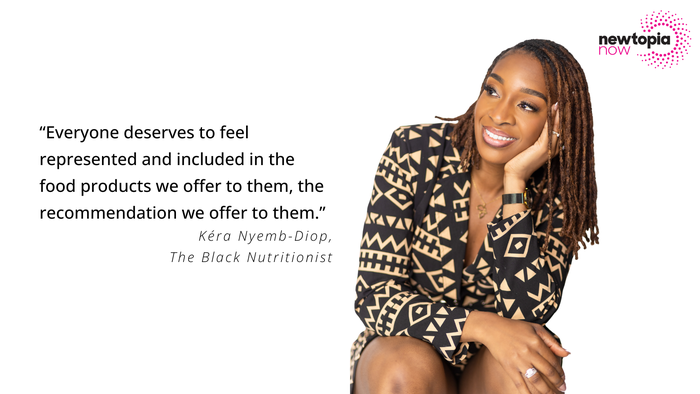Conventional nutrition recommendations overlook marginalized communities, so Kéra Nyemb-Diop is pushing for change. Read this, then attend her keynote.


At a Glance
- Kéra Nyemb-Diop, who bills herself as The Black Nutritionist, was raised in a Caribbean-African family.
- Nyemb-Diop’s perspectives and training allow her to help underrepresented people honor their heritage and eat authentically.
The nutrition world overlooks Black and other marginalized communities, and it’s time for recommendations to reflect the value of cultural foods.
That’s the main message Kéra Nyemb-Diop, who bills herself as The Black Nutritionist, will impart at Newtopia Now during her keynote, Decolonize Your Plate: A Scientific Journey to Personalized Wellness With “The Black Nutritionist.”
Raised in a Caribbean-African family and trained in France, Nyemb-Diop harbors deep experience around the “big gap between what I grew up eating and what I love eating.”
In other words, rather than continuing to take conventional nutritional wisdom to heart, advice that does not necessarily apply across cultural borders, Nyemb-Diop now taps into her own heritage—which, she says, “I have for a long time hidden”—to shape more personalized recommendations for her clients.

Kéra Nyemb-Diop, The Black Nutritionist, speaks at Newtopia Now on Aug. 26 at the Denver Convention Center.
“I thought that that part of me didn’t belong in the nutrition field, and the more I actually tap into that cultural heritage, and the more I am my whole self, the more I’m actually able to help more people and have better ideas,” says Nyemb-Diop, who officially embarked on her journey as The Black Nutritionist in 2020. She holds a master’s degree in food science from Université de Rennes and a doctorate in nutrition from L’Institut Agro Rennes-Angers, both in France.
Related:Watch on demand: Newtopia Now, explained!
“I really try to blend my academic expertise with my cultural heritage,” she says, to achieve the goal of helping people “improve their eating habits in a way that will align with them.”
As part of that line of thinking, Nyemb-Diop will address at Newtopia Now how current nutrition guidelines are lacking when it comes to the demographics she serves.
“Maybe the way a thing has always been done is not the best,” she says.
Black women, in particular, face “unique challenges,” per Nyemb-Diop, and she hopes the natural and organic CPG founders and other suppliers at Newtopia Now absorb that reality.
“When you look at mainstream nutrition guidelines that define healthy eating by white standards, it leads us to believe that that our cultural foods and body are inherently unhealthy,” she explains.
That, coupled with the food insecurity issues among marginalized communities, translates into “a lot of guilt and shame” that lays the blame for any struggles on Black women themselves, Nyemb-Diop says.
“The recommendations and the narrative around health are really focused on individual effort and do not recognize the systemic and community impact. It creates a lot of guilt and shame. It creates difficulties to adhere to the recommendation, and so people end up feeling that they are wrong, and that there is a problem with them, and so they need to change their own bodies instead of understanding that they have options,” she says.
Related:Boost your business and network: Newtopia Now agenda highlights
Those options usually mean looking for the variety of foods outside of typical American- or European-centric diets, says Nyemb-Diop. Think Caribbean Jerk spice, for example, as well as rice and curries.
“There are so many flavors we could tap into, but they’re never represented or when they are, they’re going to be only the most indulgent food.” And instead of just seeing vegetables as a side dish, consider that they deliver the same benefits when included in sauces and smoothies while, at the same time, honoring heritage-led ways of eating.
“It’s understanding that they have an asset in their culture,” Nyemb-Diop says. “Knowing that variety is actually one of the biggest pillars in nutrition, you have an asset.”
That reality also helps erase damaging scarcity mindset, she adds, or that inherent hesitation to go beyond the bounds of “I can only eat this.”
“Any prescriptive recommendation is wrong,” Nyemb-Diop says. So, too, is the insistence that people should never eat processed food and always choose organic. Those attitudes, Nyemb-Diop says, are elitist and harmful, largely due to issues of affordability and accessibility.
To be sure, Nyemb-Diop’s unique perspectives and academic training give her the tools to help people from a range of often marginalized backgrounds view and consume food more authentically.
“[A] lot of people I work with are first generation, meaning our parents were not born here, but we are born here,” she says. “And so, we are really always at the interface of our parents’ culture and the country we live in.”
That intersection provides the basis for expanding personal definitions of healthy diet and nutrition, and it delivers welcome relief to Nyemb-Diop’s clients, all of whom have tried multiple ways of eating and found them wanting.
“It’s really important to question the way we do things,” Nyemb-Diop says. “Everyone deserves to feel represented and included in the food products we offer to them, the recommendation we offer to them.”
Join Kéra Nyemb-Diop at 12:15 p.m., Monday, Aug. 26, at 12:15 p.m. on the Represent stage for her keynote, Decolonize Your Plate: A Scientific Journey to Personalized Wellness with “The Black Nutritionist.” For more information and to register, visit the Newtopia Now website.